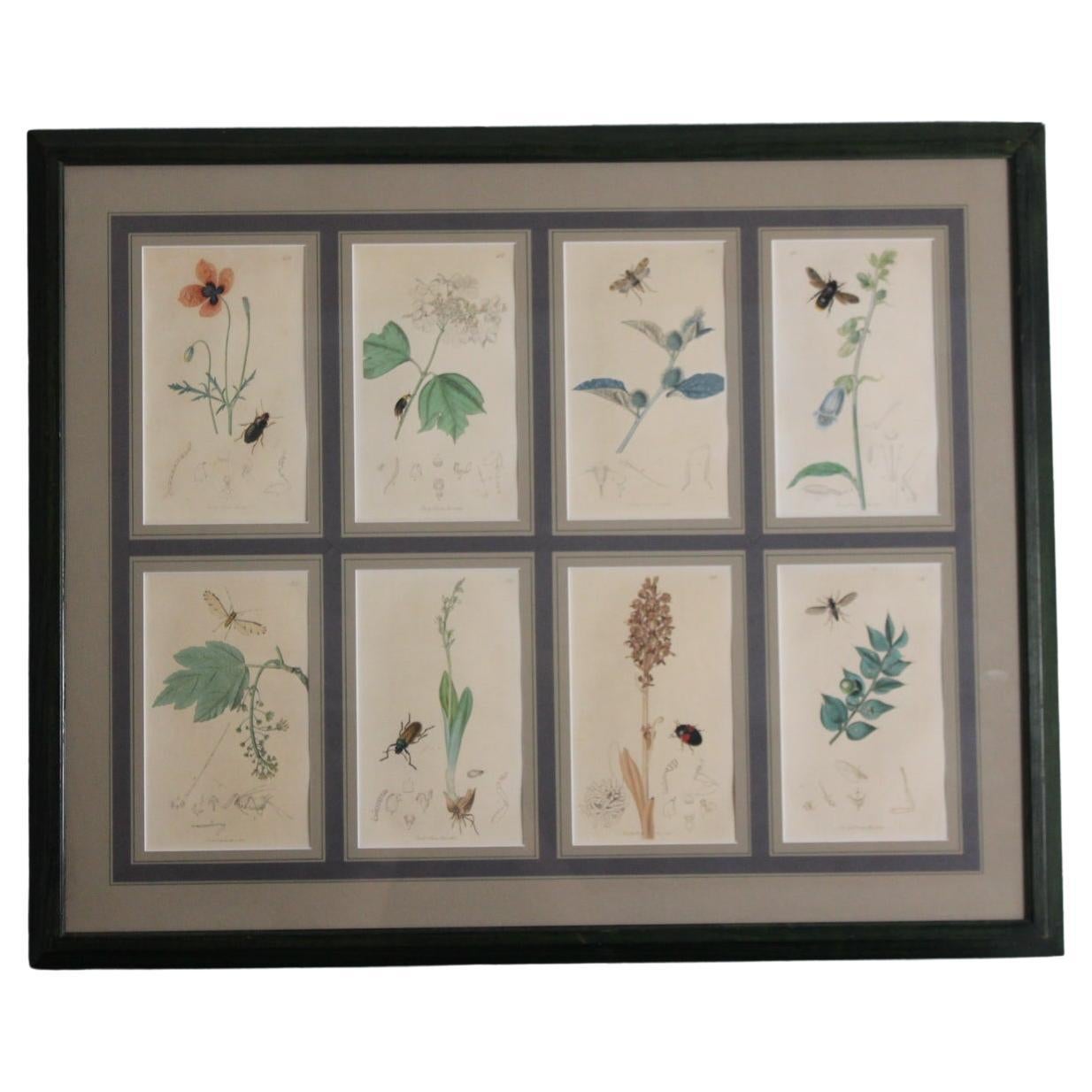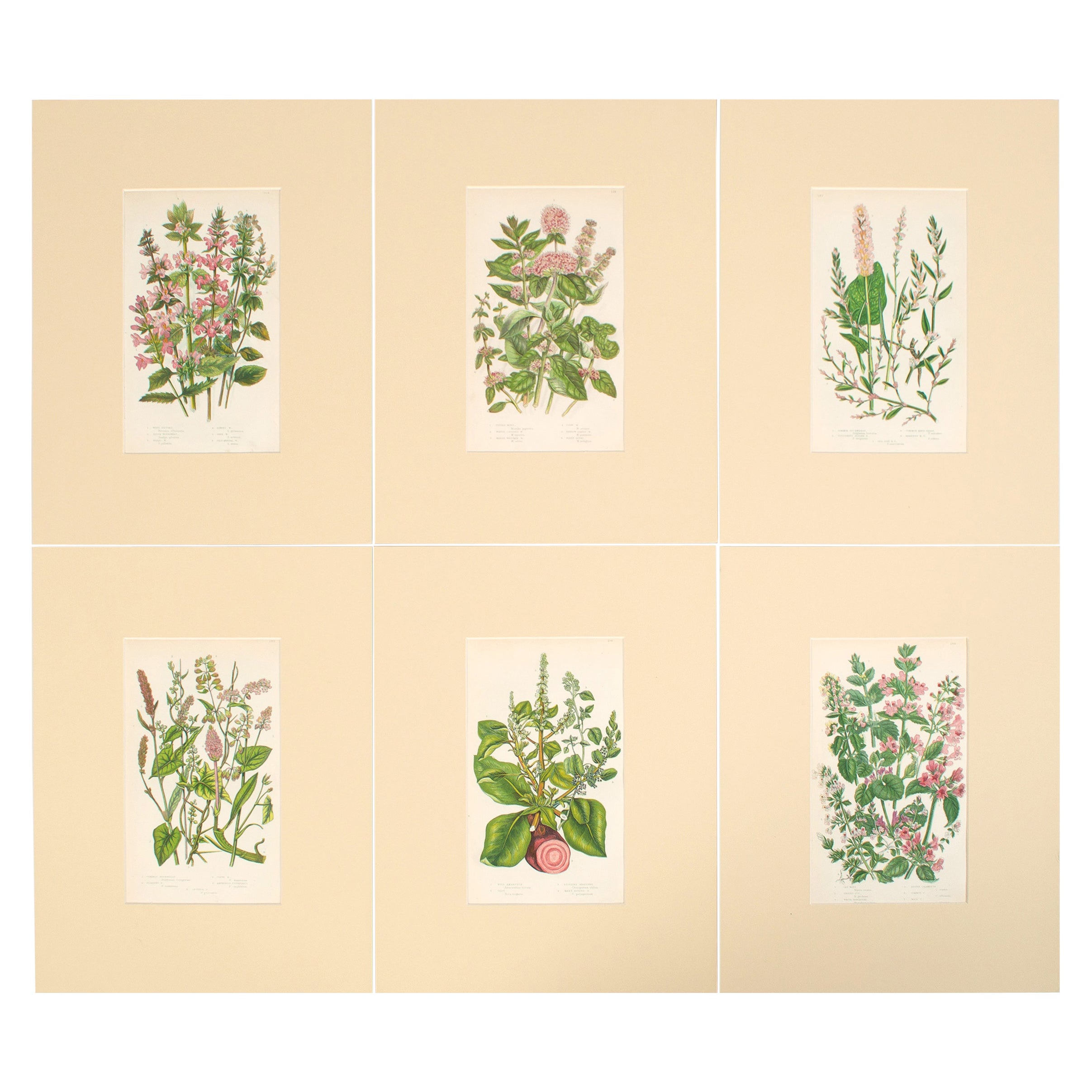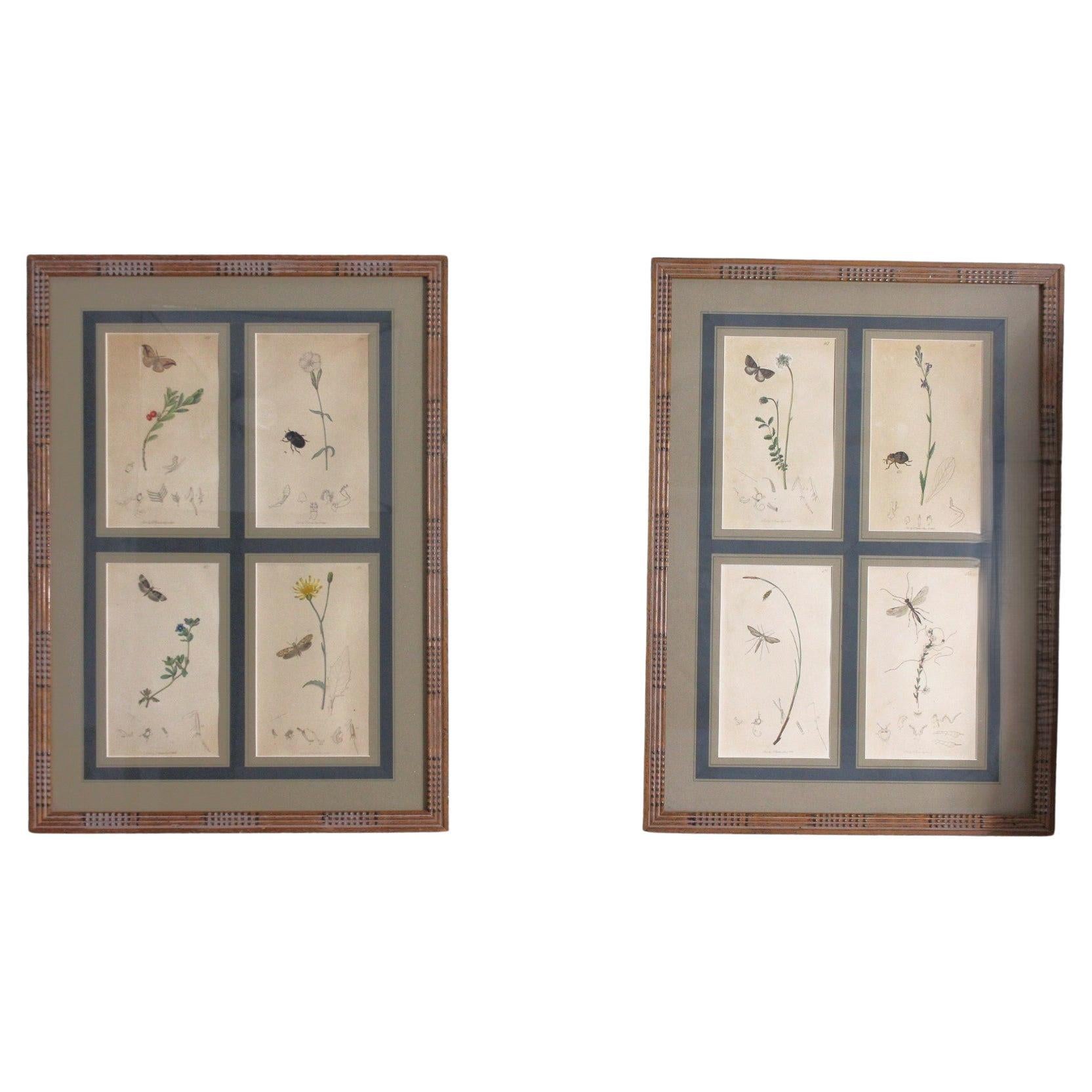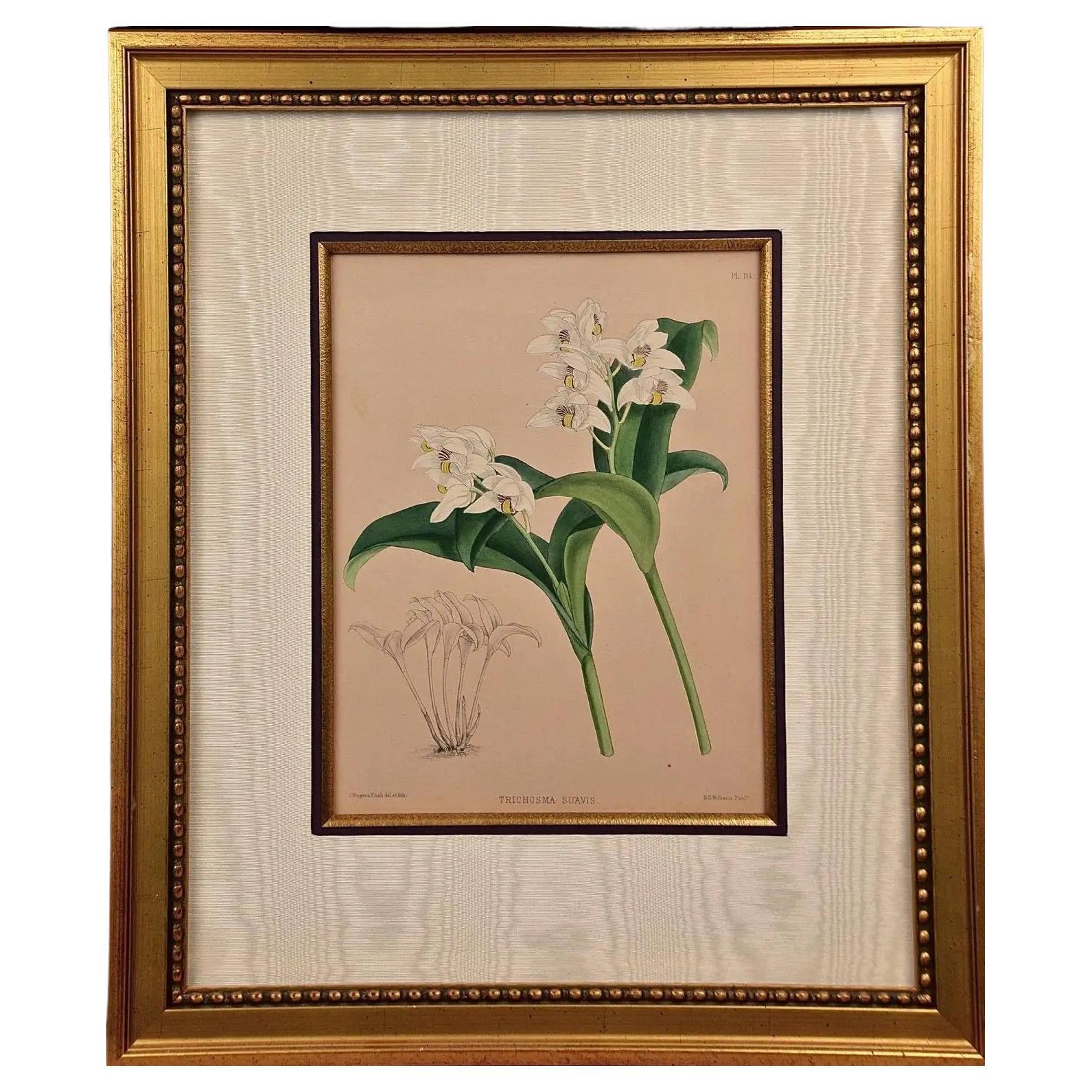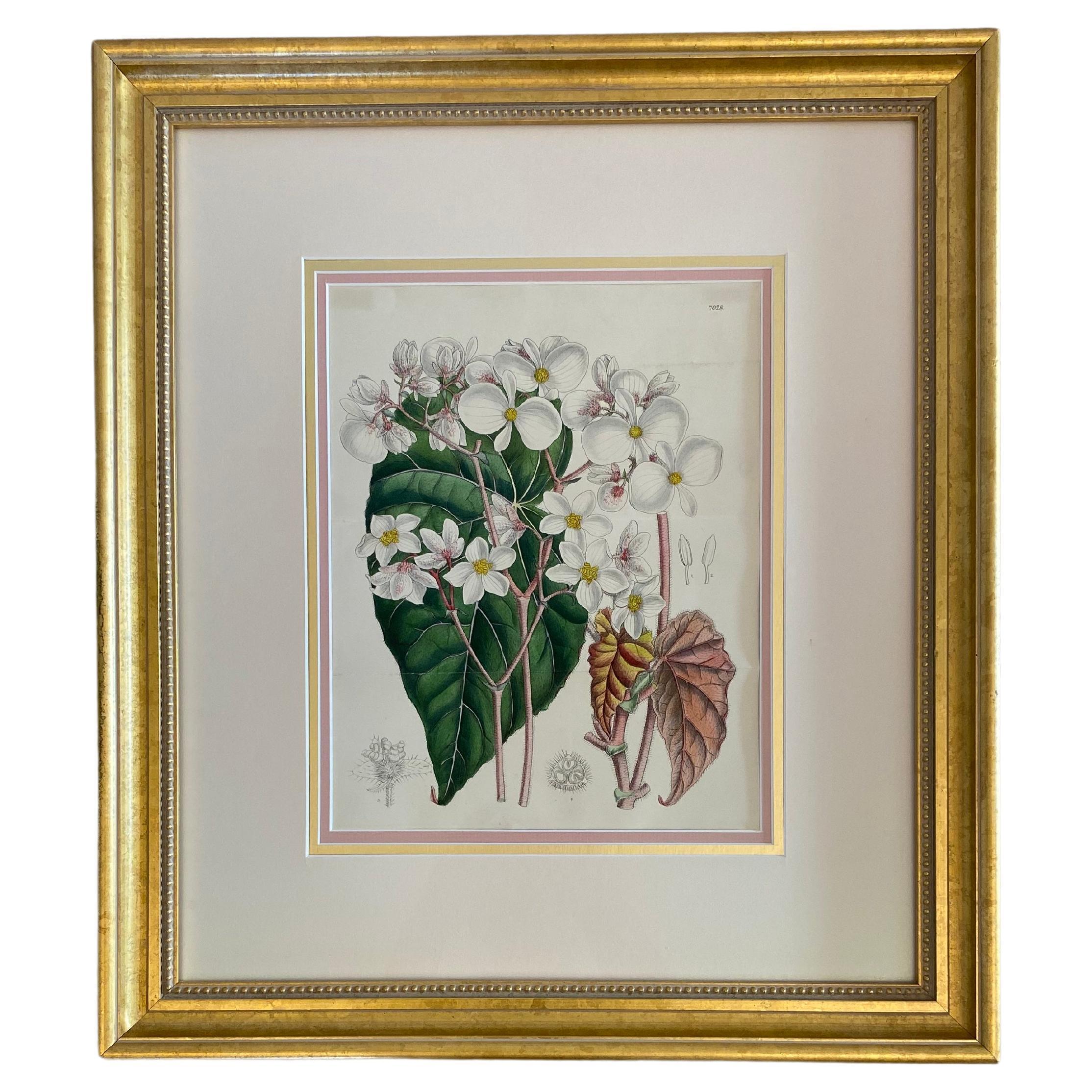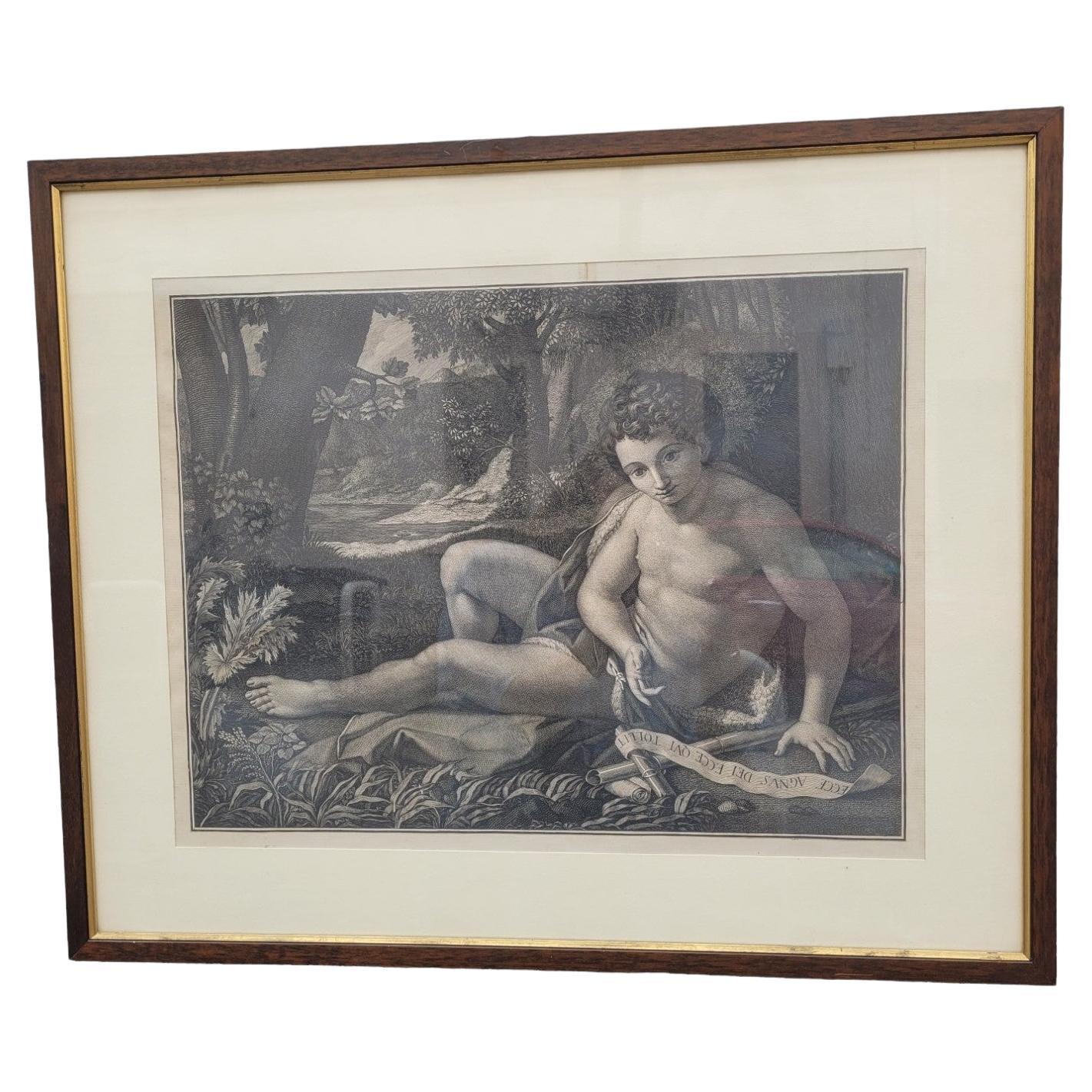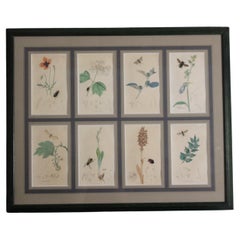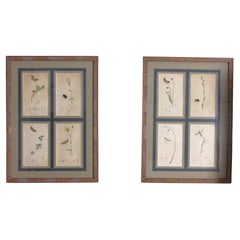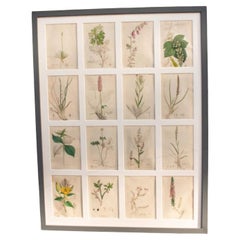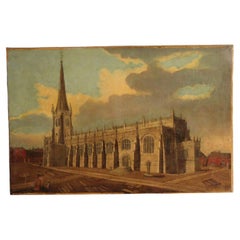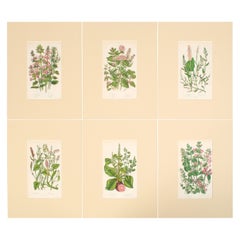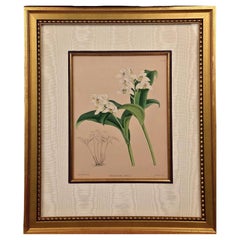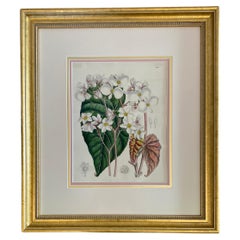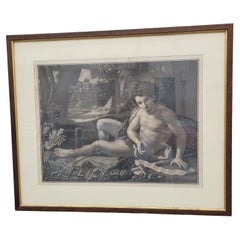Articoli simili a Botanical Engravings by John Curtis 19th century Set of 8
Vuoi altre immagini o video?
Richiedi altre immagini o video al venditore
1 di 14
Botanical Engravings by John Curtis 19th century Set of 8
Informazioni sull’articolo
19th Century Botanical Engravings: A Timeless Art Form
The Legacy of John Curtis and 19th-Century Botanical Engravings
🖋 Provenance Story – 19th Century Botanical Engravings with Insects, after John Curtis
These prints came from one of those treasure-hunt mornings — a private viewing at a longstanding dealer’s flat in Bloomsbury, stacked wall-to-wall with portfolios. In the corner, bound in archival sleeves and nearly forgotten, was a near-complete set of 19th-century botanical engravings — not just florals, but exquisite examples with entomological studies woven in: beetles nestled into petals, butterflies brushing pollen from stamens. Scientific. Romantic. Utterly mesmerising.
At the bottom of several plates was the unmistakable signature: J. Curtis. John Curtis, the renowned illustrator behind the Botanical Magazine, is a name synonymous with Victorian natural history and fine draftsmanship. His engravings — hand-coloured, scientifically meticulous — were once published to accompany botanical texts but quickly became collectable in their own right. These weren’t just records. They were declarations of awe for the natural world.
What made these particular pieces stand out was the inclusion of insects. It elevates each work, not just a study of flora, but an entire micro-ecosystem. Delicate, deeply observational, and full of movement. Each one feels like a moment captured rather than a specimen studied.
We’ve conserved them simply: mounted in minimalist, modern frames that allow the engraving to breathe — to be art, not just an archival reference. And they work anywhere. In modernist lofts, soft-toned bathrooms, layered gallery walls, or home offices that crave calm.
These are more than decorative prints. They’re time capsules of Victorian wonder — scientific elegance framed for the 21st century. For the collector, the design-lover, the nature devotee — they offer a way to anchor a space in natural history, in art, in quiet beauty.
John Curtis (1791-1862) is celebrated for his contributions to botanical art, particularly his work with 19th-century botanical engravings. In 1818, he became the principal artist of the Botanical Magazine, a prestigious publication of the era. Curtis’s detailed engravings often included both plants and insects, combining scientific accuracy with artistic beauty. His work stands as a testament to the skill and dedication required to produce these intricate illustrations.
The Art and Science of Botanical Illustrations with Insects
19th-century botanical engravings featuring plants and insects are remarkable for their detailed and vibrant depictions of nature. These illustrations were primarily created as scientific references to accompany botanical texts, yet they quickly gained popularity as decorative art pieces. Artists like John Curtis used traditional methods such as watercolour, pen, and ink to meticulously render the fine details of leaves, flowers, stems, and insects.
The inclusion of insects in these engravings added another layer of complexity, showcasing the interactions between flora and fauna. Artists paid close attention to the unique shapes, structures, and colours of their subjects, creating works that are as scientifically valuable as they are artistically stunning. These engravings provide a window into the natural world of the 19th century and continue to be cherished for their historical significance and aesthetic appeal.
Decorative Elegance: Botanical Prints in Modern Interiors
19th-century botanical engravings have transcended their original scientific purpose to become a cherished element in interior design. These timeless pieces seamlessly bridge the gap between the historical and the contemporary, offering a touch of natural elegance to modern spaces.
Enhancing Interior Spaces
Incorporating 19th-century botanical engravings into a home creates a focal point that blends history and sophistication. Their intricate designs and soft colour palettes complement various interior styles, from minimalist to industrial chic. Whether displayed as standalone pieces or arranged in a gallery wall, these prints add texture, depth, and a sense of organic beauty to any room.
Versatility Across Styles
The versatility of botanical engravings makes them suitable for diverse interior aesthetics. For instance:
In modern farmhouse interiors, they harmonise with natural materials like wood and linen.
In monochromatic or minimalist settings, they introduce a pop of colour and vintage charm.
In industrial spaces, they provide a striking contrast to raw elements like metal and concrete.
Applications in Design
Botanical engravings can be integrated into interiors in various ways:
Framed prints as wall art.
Upholstery patterns or fabric accents.
Inspirations for wallpapers or murals.
Their adaptability makes them ideal for spaces such as living rooms, kitchens, home offices, and even bathrooms, where they can bring life and character to the decor.
Timeless Appeal
Overall, 19th-century botanical engravings embody a unique blend of natural beauty, historical depth, and artistic elegance. Whether appreciated for their scientific roots or their decorative charm, these prints continue to inspire and elevate modern interiors, creating serene and inviting spaces that celebrate the harmony of art and nature.
Measurements
Width 77 cm
Height 66 cm
Condition
Very good, only very minimal age-related wear, as you would expect from the mid-19th century
Delivery
All our items will be packed with care to arrive safely to their new owners and are shipped with Track & Trace.
If you have any questions regarding an item or combined shipping, please feel free to ask.
We are happy to help you!
We kindly ask you to provide us with your phone number and email when placing your order. This will help the logistics services to locate you and give an estimated time of arrival.
We would also be delighted if you wished to make your own iries into shipping and would happily accommodate any courier of your choice.
Please note that delivery fees are based on front-door delivery. For an accurate delivery fee or any special requests or inquiries, please contact us. We look forward to hearing from you.
- Dimensioni:Altezza: 66 cm (25,99 in)Larghezza: 77 cm (30,32 in)Profondità: 5 cm (1,97 in)
- Venduto come:Set di 8
- Stile:Vittoriano (Del periodo)
- Materiali e tecniche:Carta,Inciso
- Luogo di origine:
- Periodo:
- Data di produzione:1818
- Condizioni:Lieve sbiadimento.
- Località del venditore:Seaford, GB
- Numero di riferimento:1stDibs: LU10376245217022
Informazioni sul venditore
Novità su 1stDibs
Iscritto negli ultimi sei mesi.
Ancora nessuna recensione
Venditore professionale selezionato
Ogni venditore supera rigorosi standard di autenticità e affidabilità
Fondazione nel 2021
Venditore 1stDibs dal 2025
Tempo di risposta standard: 3 ore
- SpedizioneRecupero del preventivo…Spedizione da: Seaford, Regno Unito
- Politica di reso
Alcune parti di questa pagina sono state tradotte automaticamente. 1stDibs non può garantire che le traduzioni siano corrette. L’inglese è la lingua predefinita del sito.
Garanzia di autenticità
Nell’improbabile caso in cui si verifichi un problema con l’autenticità di un articolo, contattaci entro un anno per ottenere un rimborso completo. DettagliGaranzia di rimborso
Se il tuo articolo non corrisponde alla descrizione, è danneggiato durante il trasporto o non arriva, contattaci entro 7 giorni per un rimborso completo. DettagliAnnullamento entro 24 ore
Hai un periodo di tolleranza di 24 ore per annullare il tuo acquisto, senza necessità di fornire spiegazioni.Venditori professionali selezionati
I nostri venditori di livello internazionale devono aderire a rigorosi standard di servizio e qualità, garantendo l’integrità delle inserzioni.Garanzia miglior prezzo
Se scopri che un venditore ha pubblicato altrove lo stesso articolo a un prezzo più basso, applicheremo lo stesso prezzo.Consegna globale affidabile
La nostra rete di vettori leader del settore offre opzioni di spedizione specializzate in tutto il mondo, inclusa la consegna personalizzata.Altro da questo venditore
Mostra tuttoBotanical Engravings by John Curtis 19th century
19th Century Botanical Engravings: A Timeless Art Form
The Legacy of John Curtis and 19th-Century Botanical Engravings
🖋 Provenance Story – 19th Century Botanical Engravings with ...
Categoria
Di antiquariato/d’epoca, XIX secolo, Britannico, Vittoriano, Stampe
Materiali
Carta
2.267 USD / set
Incisioni botaniche del XIX secolo
Coppia di incisioni botaniche britanniche del XIX secolo con insetti - John Curtis (1791-1862)
Venduto in coppia - Ti preghiamo di comunicarci la tua scelta al momento dell'ordine:
...
Categoria
Di antiquariato/d’epoca, XIX secolo, Inglese, Vittoriano, Stampe
Materiali
Carta
2.541 USD / set
Incisioni botaniche di James Sowerby del XVIII secolo
Di James Sowerby
Rare stampe botaniche antiche di James Sowerby (1757-1822): Un tributo senza tempo alla flora britannica
Entra nell'incantevole mondo dell'arte botanica del XVIII secolo con la nost...
Categoria
Di antiquariato/d’epoca, Anni 1790, Britannico, Georgiano, Stampe
Materiali
Carta
3.572 USD / set
Pittura a olio del primo Ottocento della Cattedrale di Wakefield, Yorkshire - John Cawthorn
Dipinto a olio del primo Ottocento della Cattedrale di Wakefield, Yorkshire - Attribuito a John Cawthorn
Olio su tela Attribuito a John Cawthorn (britannico, attivo all'inizio del 1...
Categoria
Di antiquariato/d’epoca, Inizio Ottocento, Inglese, Giorgio III, Dipinti
Materiali
Tela
Pittura di cavalli del XIX secolo
Di Rosa Bonheur
Un raro esemplare del XIX secolo dipinto dell'Horsefair a Grassmarket, Edimburgo, Scozia
Seguace di Rosa Bonheur, olio su tela
sigilli in cera indistinti del collezionista sul retro...
Categoria
Di antiquariato/d’epoca, Anni 1860, Britannico, Pieno vittoriano, Dipinti
Materiali
Tela
10.305 USD
Forgia di fabbro nero danese del XIX secolo di Edvard Petersen
Interno di fucina di fabbro atmosferico di Edvard Petersen firmato da Monogram
Questo magnifico dipinto della fine del XIX secolo raffigurante un suggestivo interno di una fucina di...
Categoria
Di antiquariato/d’epoca, Anni 1890, Danese, Pieno vittoriano, Dipinti
Materiali
Tela, Pittura
Ti potrebbe interessare anche
Set di sei incisioni botaniche inglesi del XIX secolo, Inghilterra, 1880 ca.
Set di sei incisioni botaniche inglesi del XIX secolo, Inghilterra, 1880 circa.
Montato, pronto per essere incorniciato.
Esemplari di pregio, in ottime condizioni commisurate a...
Categoria
Di antiquariato/d’epoca, Fine XIX secolo, Inglese, Vittoriano, Stampe
Materiali
Carta
John Nugent Fitch Orchidee, incisione botanica colorata a mano del XIX secolo con cornice
Di John Nugent Fitch
Questa bellissima litografia originale di orchidee colorata a mano intitolata "Trichosma Suavis" Orchids di John Nugent Fitch è la lastra 114 della pubblicazione di Robert Warner "Th...
Categoria
Di antiquariato/d’epoca, Fine XIX secolo, Britannico, Vittoriano, Arte d...
Materiali
Legno dorato, Carta
Orchidee di John Nugent Fitch, incisione botanica colorata a mano del XIX secolo
Di John Nugent Fitch
Questa bellissima litografia originale di John Nugent Fitch raffigurante le orchidee "Begonia Scharffii", colorata a mano, è la lastra numero 7028 della pubblicazione di Robert Warne...
Categoria
Di antiquariato/d’epoca, Metà XIX secolo, Britannico, Vittoriano, Stampe
Materiali
Legno, Carta
I. Johns, Incisione con cornice, XIX secolo
Giovanni Battista, incisione incorniciata che rappresenta John Young come un giovane pastore vestito con una melote, seduto accanto al suo bastone di canna cruciforme e allo striscio...
Categoria
Di antiquariato/d’epoca, XIX secolo, Francese, Stile impero, Stampe
Materiali
Carta
Set di otto stampe di gabbiani del XIX secolo di John Goulds
Di John Gould and Henry Constantine Richter
Una serie di otto litografie colorate a mano del XIX secolo di eccezionale qualità, in splendide cornici in noce dell'inizio del XX secolo
Da John Gould (1804-1881), The Birds of ...
Categoria
Di antiquariato/d’epoca, XIX secolo, Inglese, Vittoriano, Stampe
Materiali
Carta, Noce
17.175 USD / set
Incisione inglese del 19° secolo di John Jones
Incisione inglese del XIX secolo di John Jones. Il ritratto di James Reynolds dopo Sir Joshua Reynolds, 1792.
Categoria
Di antiquariato/d’epoca, Anni 1790, Francese, Luigi XV, Stampe
Materiali
Carta
